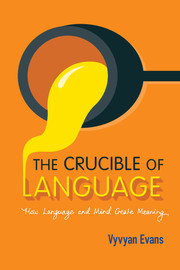Book contents
- Frontmatter
- Dedication
- Epigraph
- Contents
- List of figures
- List of tables
- Preface
- Acknowledgements
- I The ineffability of meaning
- II Meaning in mind
- III Meaning in language
- Chapter 8 Webs of words
- Chapter 9 Meaning in the mix
- Chapter 10 The cooperative species
- Chapter 11 The crucible of language
- Epilogue: The golden triangle
- Notes
- References
- Index
Chapter 11 - The crucible of language
from III - Meaning in language
Published online by Cambridge University Press: 05 November 2015
- Frontmatter
- Dedication
- Epigraph
- Contents
- List of figures
- List of tables
- Preface
- Acknowledgements
- I The ineffability of meaning
- II Meaning in mind
- III Meaning in language
- Chapter 8 Webs of words
- Chapter 9 Meaning in the mix
- Chapter 10 The cooperative species
- Chapter 11 The crucible of language
- Epilogue: The golden triangle
- Notes
- References
- Index
Summary
Until relatively recently, it was not considered good form to speculate on the origin of language. And in part, this was a sound position to adopt. By the time that Charles Darwin published On the Origin of Species in 1859, and his subsequent publication The Descent of Man in 1871, all manner of exotic theories had been put forward to explain the origin of language, replete with some equally ludicrous names. My personal favourite is the ‘ta-ta’ theory of Sir Richard Paget. Paget, who was influenced by Darwin, proposed that language may have arisen as an unconscious, vocal imitation of specific body movements – for instance, the way my tongue sticks out when I attempt a task that leaves my thumbs-for-fingers confused, such as trying to thread a needle or play the guitar. Indeed, Darwin himself was not immune, speculating that spoken language may have arisen from our ability to produce song – but it seems unlikely that singing gave rise to language. Recent research, for instance, demonstrates that ‘amusia’ – an impairment of the brain that results in the inability to process musical cadences and recognise music, and ‘aphasia’ – the loss of language – are unrelated. A person can lose the ability to use or comprehend language, but still retain, perhaps counterintuitively, the ability to recognise music. Indeed, the nature and organisation of music and spoken language appear to diverge in a host of ways– although some scientists do see value in Darwin's musical origins of language hypothesis.
When the Linguistic Society of Paris was founded in 1865, it famously included a prohibition against speculating on the origin of language in its constitution: ‘Article 11: The Society will accept no communication … dealing with the origin of language’. This stance made good sense at the time, being later adopted by the Philological Society of London. In 1873, the President of the Philological Society, Alexander Ellis, declared that ‘We shall do more by tracing the development of one work-a-day tongue, than by filling waste-paper baskets by reams of paper covered with speculations on the origins of all tongues’.
Speculation on the evolutionary basis of language remained off-limits for over a century. But by the 1970s, scientists began to again speculate on the origin of language.
- Type
- Chapter
- Information
- The Crucible of LanguageHow Language and Mind Create Meaning, pp. 279 - 312Publisher: Cambridge University PressPrint publication year: 2015



